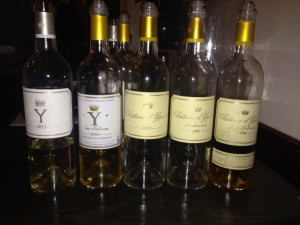Chateau d’Yquem – 2013
Masterclass with Sandrine Garbay
Barry Weinman: 16th September 2015
 One of the best jobs in the wine world must surely be that of winemaker at the famed 1st Growth Sauterne – Chateau d’Yquem. Sandrine Garbay started at the winery in 1994, setting up the laboratory. She was brought in by the Luc Saluces family, to bring a more technical approach to vineyard management, as well as looking at ways of improving the process.
One of the best jobs in the wine world must surely be that of winemaker at the famed 1st Growth Sauterne – Chateau d’Yquem. Sandrine Garbay started at the winery in 1994, setting up the laboratory. She was brought in by the Luc Saluces family, to bring a more technical approach to vineyard management, as well as looking at ways of improving the process.
In 1998, with the departure of Guy Latrille, Sandrine was promoted to winemaker at this venerable estate. The rest, as they say, is history.
Sandrine’s promotion to winemaker corresponded with a very turbulent period for the owners of the winery, culminating in the sale of the estate to LVMH. Besides the portfolio of fashion brands, LMVH also owns a remarkable stable of wineries including
- Moet and Chandon
- Veuve Clicquot
- Hennessy
- Cheval Blanc
- Krug
- Cape Mentelle
Sandrine was in town to celebrate the imminent launch of two 2013 vintage wines; Chateau d’Yquem and a dry Bordeaux Blanc labeled “Y”. The later was of particular interest, as it is harvested just before the sweet wine (just after the onset of botrytis), so there can be some botrytis influences. In effect, it tastes like a dry sauterne.
There were also back vintages of both wines, to demonstrate their aging potential.
Given its fame, the sweet wine needs no introduction. For me, I was reminded of just how elegant and refined these wines are. Poles apart from the likes of De Bortoli from Australia, or indeed any other Sauterne.
The fruit is harvested with at least 360g/l of sugar. 40 – 60% is declassified each vintage. The wines are barrel fermented in 100% new oak for 22 months and SO2 stabilised.
Given the delicacy, it is almost a shame to drink these wines with dessert. I found that the character of all the wines was more accessible as they approached room temperature, allowing the complexity and richness to become more apparent.
If there were one word that I would use to describe the wines, it would be ethereal. It was a privilege to attend the tasting.
The Wines
Chateau d’Yquem – Bordeaux Blanc – Y – 2013. The nose is savoury, dry and complex, with perfume and honey over herbaceous cut-grass characters. The palate is powerful, complex and textured, with savoury, toast-like notes and a drying finish. Not surprisingly, this is reminiscent of Sauterne in every way other than sweetness.
A blend of Semillon (75%) and Sauvignon Blanc that spends one year in oak, 20% of which is new, the remainder has previously held the sweet wine. 7 gm/l of residual sugar. 10,000 bottles made.
Chateau d’Yquem – Bordeaux Blanc – Y – 2000. The colour here is still relatively pale, tending to straw. The aromas are quite subtle, with hints of brioche and honey. It was in the mouth that this really comes to life, with honeyed, viscous fruit, fabulous mouth-feel and excellent texture. With air the intense fruit developed depth and power, tasting just like a dry “Sauterne”.
Until 2004, this wine was always a 50:50 blend of Semillon and Sauvignon Blanc. The style and consistency has gradually evolved under Sandrine’s stewardship.
Chateau d’Yquem – Sauterne – 2013. Quite closed initially. Opens to show clearly defined apricot, with hints of orange marmalade and fresh cumquat. Perfumed, with just a touch of cinnamon spice. The palate is completely seamless and very intense, quite sweet and viscous, yet refined and balanced. The wine is actually quite light and fine with delicate fruit and subtle botrytis characters. Needs years, but if you do drink it this young, try letting it warm up in the glass a little to see how it evolves.
Semillon (70%)/Sauvignon Blanc. The vineyards were harvested over a four-week period and 60% of the production was declassified. There was 100% Botrytis, 13.2% alcohol and 150g/l of residual sugar. If drunk now as an aperitif, it was suggested to serve this quite cold (7 – 9 degrees C).
Chateau d’Yquem – Sauterne – 2005. More obvious richness on the nose. Concentrated, this has complex aromas of marzipan, apricot, almond, cinnamon and marmalade. The palate is very intense and powerful, yet elegant, refined, supple and seamless. There is great life and drive to the mouth-feel, and this really builds in the glass. Stunning! (13.5% alc, 140g/l residual sugar).
Chateau d’Yquem – Sauterne – 1996. A spectacular nose that is both intense and powerful. Almond meal, apricot, orange marmalade and marzipan all come to mind. The palate is powerful and intense, yet balanced and seamless. Not quite as sweet as some, allowing the fragrant spice notes to shine on the finish. A complete wine.
From a textbook vintage, 6g/l of acidity, 125g/l residual sugar and 14% alc.
Reference
Rand M; Sandrine Garbay of Chateau d’Yquem talks to Decanter:
http://www.decanter.com/features/sandrine-garbay-of-chateau-dyquem-talks-to-decanter-246592/
